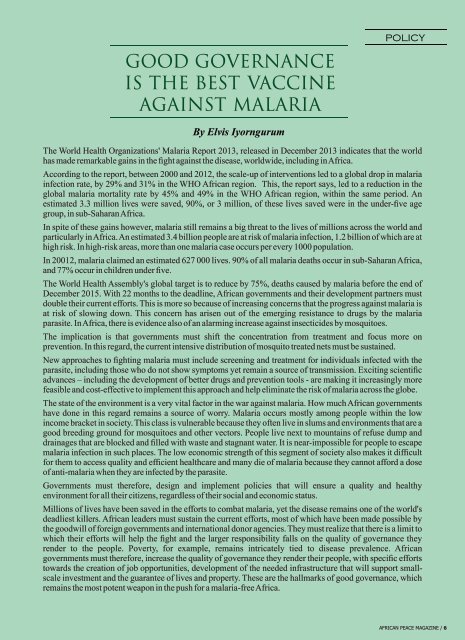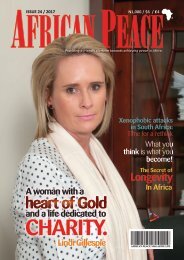You also want an ePaper? Increase the reach of your titles
YUMPU automatically turns print PDFs into web optimized ePapers that Google loves.
POLICY<br />
Good Governance<br />
Is The Best Vaccine<br />
Against Malaria<br />
By Elvis Iyorngurum<br />
The World Health Organizations' Malaria Report 2013, released in December 2013 indicates that the world<br />
has made remarkable gains in the fight against the disease, worldwide, including in Africa.<br />
According to the report, between 2000 and 2012, the scale-up of interventions led to a global drop in malaria<br />
infection rate, by 29% and 31% in the WHO African region. This, the report says, led to a reduction in the<br />
global malaria mortality rate by 45% and 49% in the WHO African region, within the same period. An<br />
estimated 3.3 million lives were saved, 90%, or 3 million, of these lives saved were in the under-five age<br />
group, in sub-Saharan Africa.<br />
In spite of these gains however, malaria still remains a big threat to the lives of millions across the world and<br />
particularly in Africa. An estimated 3.4 billion people are at risk of malaria infection, 1.2 billion of which are at<br />
high risk. In high-risk areas, more than one malaria case occurs per every 1000 population.<br />
In 20012, malaria claimed an estimated 627 000 lives. 90% of all malaria deaths occur in sub-Saharan Africa,<br />
and 77% occur in children under five.<br />
The World Health Assembly's global target is to reduce by 75%, deaths caused by malaria before the end of<br />
December 2015. With 22 months to the deadline, African governments and their development partners must<br />
double their current efforts. This is more so because of increasing concerns that the progress against malaria is<br />
at risk of slowing down. This concern has arisen out of the emerging resistance to drugs by the malaria<br />
parasite. In Africa, there is evidence also of an alarming increase against insecticides by mosquitoes.<br />
The implication is that governments must shift the concentration from treatment and focus more on<br />
prevention. In this regard, the current intensive distribution of mosquito treated nets must be sustained.<br />
New approaches to fighting malaria must include screening and treatment for individuals infected with the<br />
parasite, including those who do not show symptoms yet remain a source of transmission. Exciting scientific<br />
advances – including the development of better drugs and prevention tools - are making it increasingly more<br />
feasible and cost-effective to implement this approach and help eliminate the risk of malaria across the globe.<br />
The state of the environment is a very vital factor in the war against malaria. How much African governments<br />
have done in this regard remains a source of worry. Malaria occurs mostly among people within the low<br />
income bracket in society. This class is vulnerable because they often live in slums and environments that are a<br />
good breeding ground for mosquitoes and other vectors. People live next to mountains of refuse dump and<br />
drainages that are blocked and filled with waste and stagnant water. It is near-impossible for people to escape<br />
malaria infection in such places. The low economic strength of this segment of society also makes it difficult<br />
for them to access quality and efficient healthcare and many die of malaria because they cannot afford a dose<br />
of anti-malaria when they are infected by the parasite.<br />
Governments must therefore, design and implement policies that will ensure a quality and healthy<br />
environment for all their citizens, regardless of their social and economic status.<br />
Millions of lives have been saved in the efforts to combat malaria, yet the disease remains one of the world's<br />
deadliest killers. African leaders must sustain the current efforts, most of which have been made possible by<br />
the goodwill of foreign governments and international donor agencies. They must realize that there is a limit to<br />
which their efforts will help the fight and the larger responsibility falls on the quality of governance they<br />
render to the people. Poverty, for example, remains intricately tied to disease prevalence. African<br />
governments must therefore, increase the quality of governance they render their people, with specific efforts<br />
towards the creation of job opportunities, development of the needed infrastructure that will support smallscale<br />
investment and the guarantee of lives and property. These are the hallmarks of good governance, which<br />
remains the most potent weapon in the push for a malaria-free Africa.<br />
<strong>AFRICAN</strong> <strong>PEACE</strong> <strong>MAGAZINE</strong> / 6







